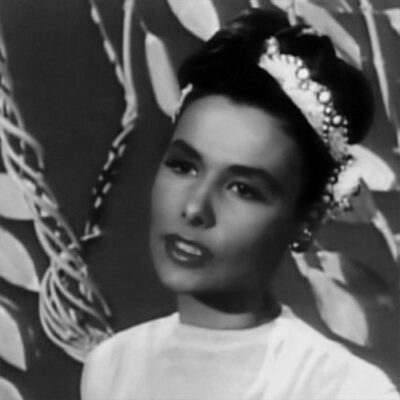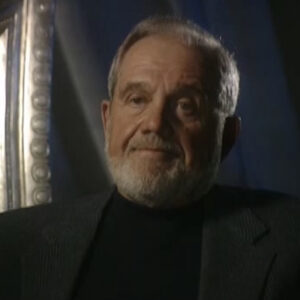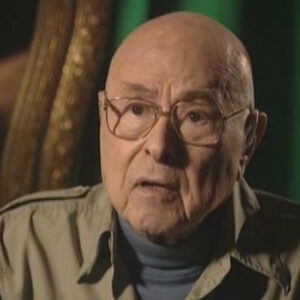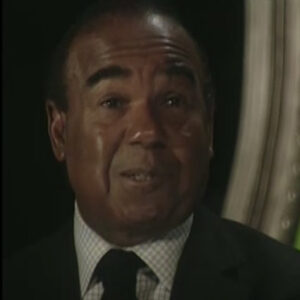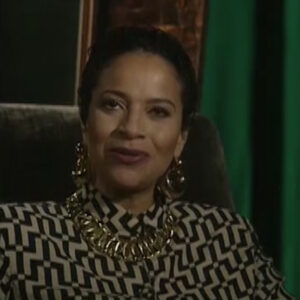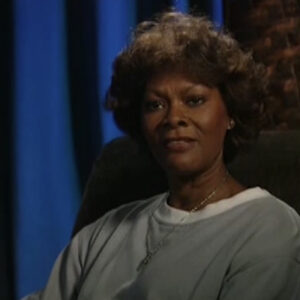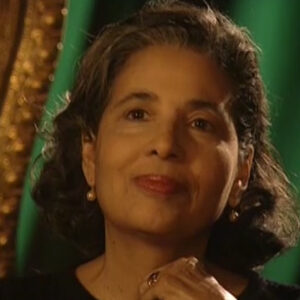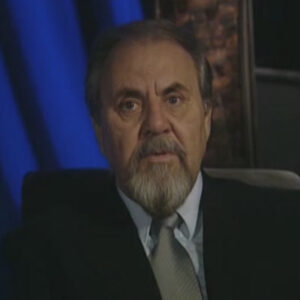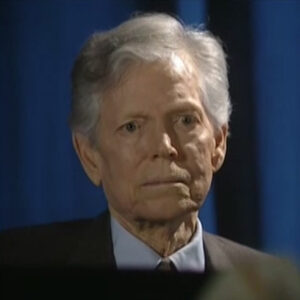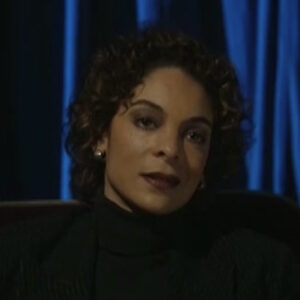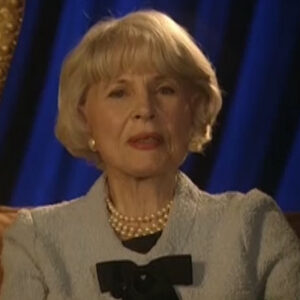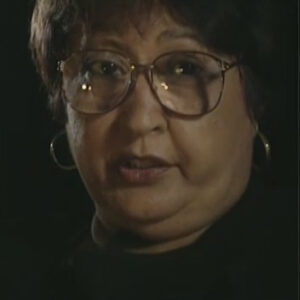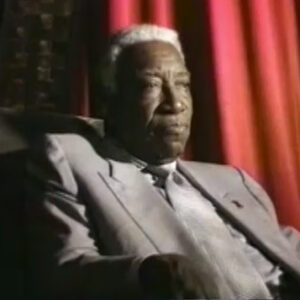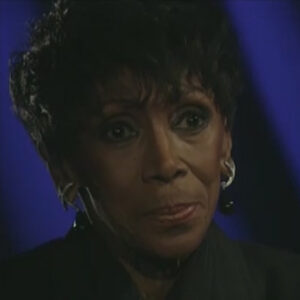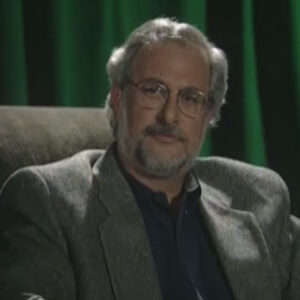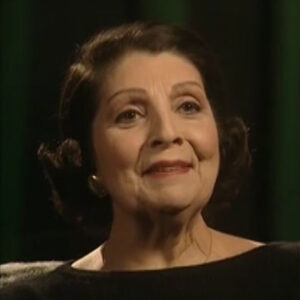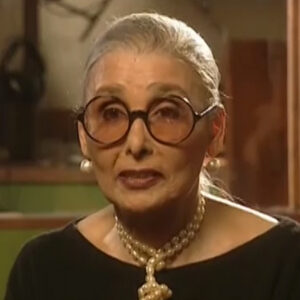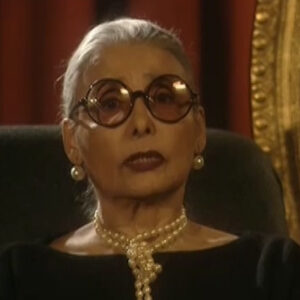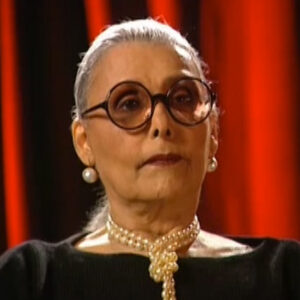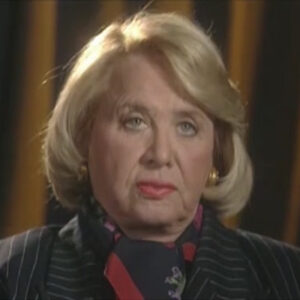Speaker Well, I had been involved with Horne on different occasions beginning in the late 60s, in 67, 68, when she had decided to go back to work, and she had asked me to help her to get some musicians together and to help get some material. I then worked with her as a production manager, and in 1972, I worked with her on a regular basis as a production manager and then later on as co manager. And we worked different clubs and theaters and working with different singers that Tony Bennett victim and Billy Eckstine, Alan King. And then in 1980, she did a tour for it was a benefit for her sorority, which she was an honorary member of the Delta Sigma Theta sorority, and she did a tour for them to raise some funds.
Speaker Many of those dates were in the south and in places that she had never played before and was during that time that she became sort of a different Lena Horne, because before she used to come out and just stand in front of the microphone and sing and she wouldn’t talk that much unless she would introduce a song medley, which she was about to do on this particular tour. She began to relate to the audience and the audience began to respond to her.
Speaker That led to the idea that, again, that she might would be prepared to do a one woman show.
Speaker The idea had been proposed so many years before that, but nothing came of it. So we did two shows, in particular, one in Washington, D.C., and another in Los Angeles, and which she really became that different, Lena Horne. She began to not only to sing, but began to talk about some things about her career, and she began to talk to the audience. And in Los Angeles particularly, there were several celebrities in the audience. And I began to notice how they related to what she was saying and began to laugh at the jokes that she was telling. And then after that, we began to discuss what what was next. And I brought up the idea of, well, what about let’s get back to this one woman show idea. And she said, well, what about it? And I said, let’s let’s see if what we can do about it. So I went into New York because she was out in California at that particular time and I decided to come in to see Jimmy Needles. And I had known Germany and the Netherlands family before. And I knew that he not only was a producer of shows on Broadway, but that he owned several theaters around the country and that Jimmy was a person that had been involved in not only civic but civil rights activities. So it was a guy that I felt could be approached. So I went in to see him and to talk to him about Lena Horne. I told him, no, she wasn’t interested in doing a Black Dahlia Black Mame or any of the other, you know, revivals. And if he had a script around that, she could do and there was nothing of the sort. So I brought the fact about this one woman show. The idea struck him and said, oh, well, maybe that’s something that could work. And they brought in a couple of the guys had been working in this production office and said, well, you guys get together and work out a budget and let’s see what we can do about it. And of course, the couple of guys, Fred Walker and Mike Fraser, came in and we got together and not only discussed the budget began to start talking about putting together a creative staff to possibly do this one woman show. And we said yes. Was Lina open to the idea of what was her state of mind at the time when I first brought up the idea about doing the one woman show and continuing, she was not too impressed about that. She said, well, you know, I’m not too sure. And I had to get on it. And I said, well, now, look, you’re still a vital woman. You still your voice is still there. You look good. You sound good. And the talent is there. Nothing has diminished. And you have a story to tell that your your situation is unique. There’ll never be another Hollywood and never be another Lena Horne. And you have a story here and your story is about a survivor. This is something that I think will go over with. Audiences, I think will work are all we have to do is get together and get the people that will be interested in doing it. And I told her I would like to go into New York and talk to Jiminy Land and see if we can’t get this on the board. And she said, well, I’m not sure about that. You can do that. She said, Oh, I want to give me a chance, let me try it. So I said, All right, I’ll go into New York and I’ll talk to Jim in Atlanta. I did get a positive response from Germany Lander, and that was the first meeting. Then I went back to her and told her. I said, look, Jimmy is interested in it. I think it’s something that can work. So let me go back to him and only if you are really willing to go through with it. She said, OK, you go ahead. I said, now we’ve got to do this because it’s something that needs to be done. It’s no one has done this type of a thing. And in many years, you’re the only one can do it now. OK, I went into Nederlander and we began to talk, pull other people and a couple of guys and to start working on the creative staff. And they decided, OK, let’s bring in a writer, which they did, brought in a writer later on, came into New York and we began to rehearse. I’m cutting short on this. And we began to rehearse and they had this writer to come in and he got carried away with the Lena Horne story. And it became a very, very heavy drama. And we said, that’s not what we want. I that’s not the story are. So they had another writer. Stand by. In the meantime, we’re in rehearsals and Lenny began to talk and to do the introductions to the songs, and she began to go into some of the dialogue that she had been doing on the road and a couple other shows. And we decided, OK, let’s have someone to tape what she’s saying and doing the rehearsals there, that subsequently we had people continue to tape the show. What she was saying, which eventually became the libretto for the show. The show was about a survivor. There will be new that there will never be another Hollywood. It will never be anyone to go through what she did during that particular period she had gone through from the 40s or 50s or 60s or 70s and 80s. And here it is, the 90s. And she still had the voice. She still had the look. She still had the vitality. So let’s go through with it and let’s get it done.
Speaker Thank you. Now, tell us about the response. Obviously, you’ve had tremendous confidence in the show.
Speaker And you are the audience and hopefully well in getting the show to tell you they’re getting the show together, we were very fortunate that we were able to get the creative staff and get the people that we wanted in there. And we were very fortunate also is that in the fact that we were able to get the approval and the artistic control of this was extremely important because we were able to put on the show that she wanted to do and that we wanted to have done. The rehearsals went ahead and we finally got to the previews and the material. The show was the first preview. First shows were extremely, extremely successful. The audiences just went crazy over what was being shown, what they saw and what they heard. They had never seen this type of performance by Lena Horne before. And we had about 10 or 12 previews. And then the opening night, finally, Lena had said, come on, I’m ready to get the show over with. I get to open. Let me start over again. I’m sorry. We had done about a few of the previews. We were scheduled to do about 10 or 12 previews before officially opening. And Lena Horne was getting a little fidgety. She said, all right, I want to get this opening over with. Let’s get the critics in here. And we finally had to tell her, well, just before the opening night that the critics had already been there, that they had seen the show and the response from not only the critics, but the audiences were so enthusiastic that she was just overwhelmed. No one had ever seen Lena Horne, this Lena Horne before. Generally, she would come out in the clubs and theaters and stand in front of the microphone and sing the songs. And that was it. This way. She came out and she was all over the stage. She was telling her story. She was telling jokes, and the audience began to just eat it up. And she was just could not get over the fact that what was happening or what was going on. The show lasted 14 months, and I think it was at that time, maybe still as long as one woman show in the history of Broadway. Great to on the back for a second.
Speaker To. You were talking about this differently or nobody seen nothing. And I know that story from all the research that you think you could try to some sort of say. Had happened to Lina that allowed this new Lina to come for. And that’s a really long story to try to find a few key things.
Speaker That you think made it possible for this new.
Speaker One of the things that began to happen with Lena in preparation for this show is the fact.
Speaker Could you just say without saying the last name?
Speaker Well, I always say, yeah, the people that are close to her never Carlina. We always the most of us either call her by her full name or we call her Miss Calhoon. Our lady, our the lady, none of the people that are really close to ever closer. It’s been a strange thing that we leave that to the to the fans, to other people. We have a couple other names that a combination of names that we call her that when we are out in public, there’s a lot of people around. We can call her and she’ll know it’s one of us. So that is one of the reasons why most of us either call her Lena Horne or Miss Calhoun, but those we never call Lena.
Speaker So in in speaking of her, I always call her Lena Horne or I’ll say the lady or I just say whatever you like.
Speaker So now that we know that I will it yeah.
Speaker I realize it does sound formal, but I don’t know.
Speaker That’s just the way that’s why it’s always it’s always been.
Speaker I never call it if I say when she said don’t call me Lena, you know, because it’s and that’s with a couple others, a very, very close people around her never called a Lena.
Speaker It’s me. I love this. But you know.
Speaker But the metamorphosis of Lena. Or together on that stage in Vegas, oh.
Speaker In talking about doing this one woman show, Lena Lena Horne had to be convinced of the fact that it could be done.
Speaker She at first said, well, people are not going to stand for listening to me for two hours or two and a half hours. I said, well, they will if they hear the whole story. The show was about a survivor. And here’s a woman who started in the 40s and gone through a lot of turbulence, a lot of rejection. She had had some good receptions from different people, different sources now and here it is the 90s and she still has her. You still have the voice, looks the vitality.
Speaker So let’s get out and do it. And she said, well, I’m not maybe I’m not the person to do that. I said, well, you are. And and you can’t just sit around here now and just, you know, rest on what you’ve done. You’ve got to go out now, the time to really make a statement. And this statement can be this one woman show.
Speaker And let’s go in and let’s get it done.
Speaker And internally, though, I mean.
Speaker Lina had experienced a. That enabled.
Speaker This person to emerge, I mean, they had always sort of held back. Miscounting always held back in her.
Speaker Um, and can put up a wall between herself and the audience, but she talks about very openly. But she also had, you know, a lot of repressed emotions. Uh, that she didn’t really allow for this show. This three woman. Had she had all of this? And I’m interested in your insight into the. What had happened that made her comfortable?
Speaker Well, excuse me, in 1980 on this tour that we did for she did for the Delta sorority as she played in a lot of towns, a lot of cities in the south southwest that she had never played before.
Speaker She played before. Many people that have never had never been able to see her offered to come to the big nightclubs that she had played in. So she came there and to these theaters, these auditoriums, and appeared before these people. And she began to talk to them and she began to talk about her career and the audience began to relate to her and on occasions would talk back with her.
Speaker This gave her a different perspective toward her audience. It opened her up in a way that she had never, ever before been able to do. She was able to convert to this person that now I am I’m free to to express myself. I’m free to go out on a limb now. I can I can dare to to let them see who I am and what I’m about.
Speaker And the she would look into the faces of the audience and see those people saying, yeah, sister, I’m with you. Go ahead, tell me. And she began to say, okay, I’m going to tell you. I’m going to let you have it. I’m going to let it all hang out. She did that in those shows there. Then she when she got to Broadway and the same thing began to happen, she began to see faces that she had never before been able to relate to.
Speaker And it brought out this new person, this new vital energy that had never been expressed before on stage.
Speaker And as I said, she would be used to before to stand there in front of the microphone. And she never took the mike off to stand. And she did her numbers and that was it. This time. Now she gets to Broadway. She had the mike and I and she walked all over the stage. She began to relate to people.
Speaker She would find a face in the audience and she would tell her story to that person. And it was a very strange thing. Also doing the run of the show after the show and during intermission, you could hear people all over the audience, all out in the lobby at innovation saying she looked right at me, she was singing right to me. And it was a very strange thing that everyone felt that way. She had touched them, no matter whether they were sitting in the second row or the 25th row, they all felt as though she had her eyes focused on them. So, um, and that gave her more impetus. And sometimes we had to go and say, look, this show is running too long. You’re getting too carried away. We’ve got to tone down a little bit. You got to cut short the show. And she began to really enjoy her performing more than she ever had before in her life. That’s great. That’s one.
Speaker There is something about that show in there that.
Speaker And I gave her a very, very unique and individual story, but the story of survival story of.
Speaker People can relate any way on any level that they. I need to tell the story of someone’s struggle and survival.
Speaker Both kind of identifying way to admire. What do you think is particularly about the story touches people’s hearts?
Speaker Well, I think that people began to relate to her and relate to the show because she is a woman, as I say, that had come through a lot of turbulent years and a lot of the dialogue, a lot of the so-called jokes, as she was telling, were tongue in cheek.
Speaker She had reached the stage now and these years here in the 1990s where she could look back and say, well, that was funny.
Speaker It’s funny now, but it wasn’t funny then. And she said, I can look at it, that it was silly to have gone through these type these things and to have suffered the way I did.
Speaker And yet now I can look back at it and say, hey, look, I made it. I survived that. I didn’t become a dope addict. I didn’t become an alcoholic. I didn’t go crazy. Although she would say sometimes you, you and I think I’m going crazy or people will say I’m crazy. But she still had, you know, some bit of sanity.
Speaker And it it it got over to people that here’s a woman that she went through this period and she came out of it. She didn’t want her success. She didn’t wallow either in what had happened to her and the different distressful things that had happened to her. She didn’t I didn’t say, oh, pity me that I had to go through all of this.
Speaker She knew that those people in the audience and say, hey, look, you want to talk about some hard times? Look, I’ve had some hard times, too, but those people were able to relate to her. And there was another thing to let’s face it, the leader was was 60 years old and there were many women of her age and maybe even a three or four years younger that thought that they were old. They came there to see her and said, hey, look, if she can do that, she can be very vital. I can go out here, go back home and be a little more alive. Also, we did get letters of people that said I brought my mother here after she had lost her husband and my mother had just given up. I brought her here to see this show. She saw, you know, up there on the stage over 60 years old.
Speaker And my mother said, hey, look, uh, I’ve still got a life. I still, you know, have years left that I can go out and do things. I can become involved. And we have many, many letters that came in, uh, speaking of of what had happened to not only to them, but to their mothers and and to the fathers to.
Speaker We got three minutes, so let’s try to do this is the answer in 10 minutes on the show and she was showered with awards.
Speaker Can you? In a very casual sort of way, say one, that this diplomat and you know, it’s interesting.
Speaker Well, this show, of course, was extremely well-received and got many awards, Tony Award Drama Desk award winning a couple of Grammys, and there were times when she said, I still don’t believe it.
Speaker And we were, you know, those of us backstage and those of us that were connected with her were walking on cloud nine. And we still sometimes had to convince, you know, you got it not because of what you looked like, but what you were getting over to people, what the way that you sang and what you were portraying to this these audiences and what you were saying and your songs. That is what people came there to see, not what you look like or what the gowns were like or what gowns were wearing.
Speaker They came there because it was an exhilarating experience.
Speaker In addition to the words relating to music, they have got all these extraordinary awards.
Speaker Well, there were after doing the show because there were several awards and afterwards there were other many other awards that were given to her, the Spingarn Award, which came from the NAACP.
Speaker She received the honorary doctorate from Howard University, which pleased her very much. And also she got an honorary doctorate from Spelman University that she was very pleased about and several of the Kennedy honors of 1985 86. And that, well, Kennedy honors she was given. Um hmm.
Speaker To a black man. Well, the ASKAP. Oh, in the ASKAP Pied Piper Achievement Award, she also received the Grammy Lifetime Achievement Award.
Speaker And that’s OK.
Speaker Um, there’s a story that she, I think, tells in her book now in an article, because the thing is that when she was touring with Tony Bennett, um. Something was happening, I’m not quite sure which doesn’t refer to it, but that, um. She insisted that the show be canceled because of black children being beaten in the streets and black people being beaten in the streets, and I don’t remember the exact year, but was when she was touring with Tony Bennett, which would have been in the late 70s, I guess. And that lost a lot of money on the show. But the Tony was very supportive of it and that she just insisted that. I mean, the significance of that story is that it shows that Lena didn’t stop in her political involvement. She never stopped being involved daily in the civil rights movement, but that she continued to fight and make statements on the political scene. Is that your story?
Speaker Yeah, story in the context of continuing. Always to be on the lookout. Politically, thank you.
Speaker Her role in the nineteen seventies after a period of not performing, when she decided, OK, she would go back to perform and she had worked with Alan King, and then she did a series of concerts with Tony Bennett and a couple of TV specials. And we performed in several cities across the country. And in nineteen oh, I don’t remember the exact year was in the 1970s. She and Tony Bennett were booked to play a city in the north east.
Speaker I don’t know whether I should mention the name of the city or not. Anyhow, during this particular time, just before scheduled to do the concert. There was quite a bit of disturbance going on about schooling. There was some civil rights unrest and there were several riots and a number of black children were beaten up. It was quite a disturbing thing that was happening, that was going on.
Speaker And she and Tony Bennett were scheduled to appear in this particular city or maybe a week or so after things that sort of calmed down. It was with a very few days after things have calmed down, but things were still sort of in an uproar. And then, of course, everyone was very aware of what had happened. And she had talked to myself and the manager of Harris and said, look, I cannot I refuse to go into this city and perform. I cannot go in there and on a commercial basis and take money out of that city.
Speaker When my people and youngsters are being hurt or being deprived of certain things, I cannot go in there and work. I refused to do it. And we had contacted Tony Bennett and said, Tony, she is not going to do this. She cannot go in and perform. Tony said Bennett, who has always been involved with civil rights activities. And he said. If Lena Horne does not want to go and play there, I agree with her, I agree with the circumstances will back out. We won’t go in and play. I am with her 100 percent. So at a tremendous cost of moneys and salaries, you know, they cancel the concert. And to this day, she’s never going back to that city to perform.
Speaker Um, I may have to tell that a little better, but now I can.
Speaker Was there, um, I was say, Boston, I don’t know whether, you know, I should I you know, it’s OK.
Speaker I like that. Um, I used feel that it may, you know, put it right on that what happened.
Speaker A lot of other cities, too. But that’s the one where she gets the concept. I think it’s become the universal you.
Speaker Yeah. I just felt it would hurt her to station up show showing this.
Speaker You know, they may say, hey, look, man, you know, um, um, let’s let’s get back to the really to the early 70s before, uh, lady and the music that period.
Speaker Between. Leanna’s daily kind of had put a really important career on hold for the civil rights movement. And beginning to go back out on tour, and there was. A series of very significant tragedies in our life. If you could just. Tell us kind of what had. And it’s partly by way of information, because we don’t really have a story, you know, lean in in the space of 18 months, in the early 70s, Lena lost her, you know, her her father, her son. You know, if you could just say that and then what? What impact, obviously, was devastating, if you could talk about her state of mind.
Speaker Calling for a retreat from.
Speaker During the following years, it was the years that I started working on being associated with Lena Horne on a working basis.
Speaker Certain things began to happen in her life and they were her son was ill and she was quite worried at that time about him. And her mood at that particular time was not the greatest because she was deeply concerned about him and she didn’t feel as though she would get out and go and perform and sing and work.
Speaker And shortly after that, those things would get.
Speaker Oh, sorry.
Speaker She got into a situation where after they found out that her son was very seriously ill, this went on for a few months and she was quite despondent about that.
Speaker And consequently, the son died, which was sort of devastating to her, and she had done everything she could to try to save him. He had a problem with liver disease and she was very despondent over that. A few months later, after that, her father, whom she had been reconciled with and was with and was having a great, fantastic time being with him and reminiscing of old old days and enjoying his company. He took ill and he passed away. That was about six months after she had lost a son. That was another blow.
Speaker And after a while, she began to sort of get over that shortly, maybe another six months or so, her husband passed away. This is all of this was happening within about a year and a half. And she was not in too good a mood to want to perform or to even get out and to socialize with anybody.
Speaker And she knew that she was alive. She wondered why and she began to wonder, what else can I do? You know, can I get involved more into the civil rights movement or just what? But nothing was just going for her. And I think it was Alan King that finally had called her up and said, hey, look, I’d like to come up and see and talk to you. And Alan came up and said, hey, look, you can’t just sit around and mope and waste your life away. Now you’ve got to get up off your duff and get to work. You’ve got to, you know, live. You’re still a bright, you know, vibrant person. And somehow I think in two or three months, it it kind of it worked. And she decided, OK, excuse me.
Speaker But I’m not allowed to say that.
Speaker I’m not getting carried away if I have a leaky I understand. Yeah, I just have a leaky I am sorry. OK, go.
Speaker So after the talk with Alan King and she called got together with myself and the manager of Harris and said, well, maybe I should get back and try to do something and get back to work. And it was it was tough during that particular time. And it was something that she had to remind herself that they had given her something and they had given her the strength to to go on. And she thought about the love that had been given her by these three men and perhaps she could get back out and perform again. It took, you know, quite a number of weeks of rehearsals and getting her mindset into it. But finally, it it began to happen.
Speaker Just one last question I want to watch is, um, following maybe the music as late as last year, um, Lena. Recording two very successful records.
Speaker Can you talk about those? It was the. And there was one the story. We’ll be together again. We’ll be together, yeah. I mean, just information, so we will be together again.
Speaker Uh, years after leading the music, uh, Lena Horne did a few engagements, not many. And she did some private engagements. Then, uh, she decided, OK, maybe I’ve had it, uh, and I should start hanging it up. Uh, and after maybe three or four years of not performing, uh, there was a celebration being done. It was a jazz festival that was going to honor Billy Strayhorn. And she was approached by the people putting on this the festival and said, we would like for you to come in and perform at this festival. And although she had not been performing for four years, she said, I think I’d like to do that, which she did. And the response there with the audience was tremendous, was fantastic. She did some songs that Strayhorn was associated, had written for her, and that she had been associated with Whitney a number of years following that. Nothing else was happening. And finally we talked to her and we said, hey, look, uh, you got the boys back again. Why not? Let’s do an album. And there had been a very good friend of hers, Shirley Carroll, who had been after her for a number of years to do an album. And finally, we had called up Shirley and said, are you still willing to, you know, get this album going? She said, oh, by all means. And we began to get some material together. And she said in tribute to Billy Strayhorn and other guys, she would record this album.
Speaker And it was er entitled We’ll Be Together Again, meaning with Strayhorn and some of the other musicians and people that she had known. And the album was very successful. It was a very good album, was acclaimed by critics, et cetera. And uh, she again decided, OK, that’s it again. Um then uh, later on, a few more years have passed, go back to Italy, a couple of years have passed and we again began to talk to her and say, hey, look, one last shot. She said, oh, you can’t go home again. I said, oh, yeah, one more time and you can do one more big concert. And we twisted her arm and she did two concerts at Carnegie Hall and it was in ninety four. And then we’d recorded the album at the Supper Club, and that was the last performance that she, uh, platformer said she had done.
Speaker I just, um. So the last question really is later on today for Life Today, you just say something about. Where her focus is now on her family.
Speaker How she feels about that being random?
Speaker Well, at this particular stage, the Lena Horne of today has said, well, that’s it.
Speaker And those of us that are connected with her and my being a manager at the time, I recognize the fact that she has put out an awful lot. She’s been out there and on the battlefields for, you know, those for many years now. And when she says now, I think I’ve had it this that’s it, I, I believe it. And I go along with it. Uh, not that she doesn’t have the voice. I think the voice is still there. I believe she could still do a concert. Now, however, I feel as though she has earned her time to rest and she’s reached, you know, a nice round figure and she has a great interest now. And that great interest is a great, great grandson. And she’s very happy when he comes around, when she’s around him, her eyes light up and it is and she’s a different person. She can be moping around and dragging around and saying, oh, I feel my age today.
Speaker But if that child comes around, it’s like she’s 40 years old again and she’s talking about the apple of a I. That’s it. And she’s she lives to come and play and see the smile and play with that great grandchild.
Speaker How does she tell you stories about her grandmother?
Speaker Well, he’s not to the point yet where she can tell him the stories and fact people keep saying, asking her say, do you sing to him? She said, no, not yet. You know, I think she’ll try to sing a little nursery rhyme to him every once in a while.
Speaker But she has not done any other singing to him yet. Uh, he’s I don’t know if he would know if she knew what she’s about at this age yet about.
Speaker Did she tell you anything?
Speaker No.
Speaker You know, as it’s always been a very private person, not only to herself, but to her family, to her granddaughter, like Jenny and Amy and to and she’s grandma to them. She is not, um, Lena Horne. Uh, she leaves that outside and she does not dwell on it.
Speaker And I don’t think she even wants them to talk about her own stage or what she has done or what she’s accomplished. She just wants to say, hey, look, I’m your grandma and and that’s it. And I think she’ll be that same way when Jake is a little bit older.
Speaker I’m your great grandma and don’t you forget it. That’s what she does.
Speaker And, you know, thank you very much.

